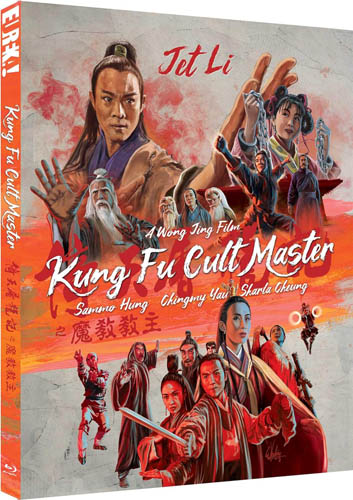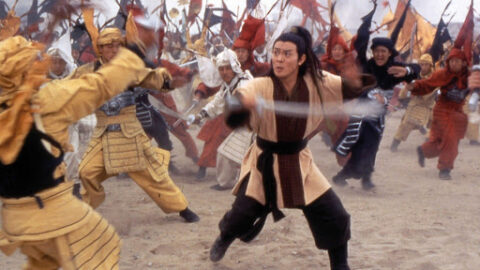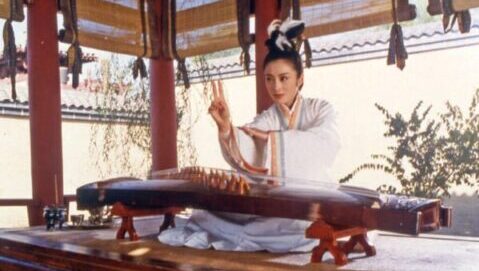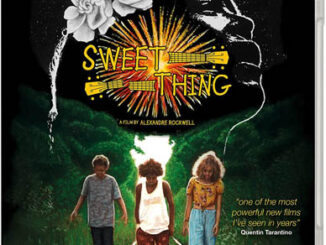Kung Fu Cult Master (1993)
Directed by: Wong Jing
Written by: Louis Cha, Wong Jing
Starring: Chingmy Yau, Jet Li, Sammo Hung, Sharla Cheung
AKA Yi TIN TO LUNG GEI: MOH GAAU GAAU JUE
HONG KONG
AVAILABLE ON BLU-RAY: 29TH JANUARY, from EUREKA ENTERTAINMENT
RUNNING TIME: 97 mins
REVIEWED BY: Dr Lenera

During the Yuen Dynasty, many sects compete for possession of the two golden swords which contain the secret to dominance of the world of martial arts. The first faction, led by Shaolin, consists of Shaolin, Wu Dang, Emei, Kun Lun, Kong Tong and Mount Ha clans. The second is the Ming Sect, otherwise known as the Fire Sect or Evil Sect, led by Purple Dragon Queen, White Brow Eagle King, Golden Haired Lion King, and Green Winged Bat King. Chang Tsui-san, a student of Wu Dang, befriends Lion King Tse Chun and marries Yam So-so the daughter of White Eagle. Years later their infant son Mo Gei witnesses his parents kill themselves rather than reveal the location of one of the swords. He vows revenge, but there’s one problem; he has a jinx which prevents him from learning martial arts….

For the umpteenth time, I ran through my head something, as I was watching Kung Fu Cult Master. Do I prefer the old school Hong Kong martial arts pics with their long takes and greater realism, or do I prefer the later variety with their quicker cutting, their flashiness and more fantastical style, with the idea of leaping and jumping being substantially increased? When I was first getting into these films around 1990, it was the newer sort that attracted me much more. However, over the years I came to love and respect the traditional movies just as much, and now I’ve reached the point where I think I prefer them, even though my adoration for films such as Zu: Warriors Of The Magic Mountain, Once Upon A Time In China and the somewhat more obscure Deadful Melody will never die. Despite this, I was looking forward to seeing and reviewing this previously unseen by me Jet Li movie straight after doing Eureka Entertainment’s release of When Taekwondo Strikes. It leaves great deal of things hanging, but of course that’s not the movie’s fault, the story was originally intended to be continued in a second instalment but poor box office ensured that this couldn’t happen. So let’s try to take it on its own, which may not be too easy seeing as any viewer will probably want to see how the tale carries on. It’s not the easiest of ones to follow in this rather condensed form, with so many factions and names to remember, though basically it’s the old thing of lots of groups after a manual or a sword, and that other old thing of somebody having to learn a style. though here our hero isn’t initially so much as useless at fighting as having something inside him which prevents him from doing so. There’s an often bonkers imagination at play as combat can incorporate all sorts of things, while it’s all very visually pleasing too. The light tone is just right; a few jokes are thrown in, if usually sex-related, and the thing has a sense of its own absurdity, but the drama is done straight and we are involved even when we lose track a little. Yet again, the underrated Wong Jing impresses.
The opening almost seems designed for us to lose track, as it’s complicated and throws loads of names at us. A narrator and visuals tells us of a married couple who made the Dragon Slaying Sabre and the Heaven Reliant Sword. Inside the swords were put [for some reason] the Nine Yin Manuals which, if learnt, can give someone dominance of the martial arts world. We see some battle footage as we learn that six factions fought each other over these swords; the Shaolin, Wu Dang [which I assume is Wu Tang], Emei, Kun Lun, Kong Ton Tong and Mount Hua clans. And against all them are the Persians [?], probably more accurately named as the Mings. There’s a rule that nobody can befriend an enemy, but the Wu Dang’s Chang Tsui-san broke this rule and fell in love with Yam So-so, daughter of the White Brow Eagle King of the Mings, and also became bloodbrothers with Golden Haired Lion King master Tse Chun. However, another Lion King Shing Kwan killed Tse’s family, and Tse, Tsui and Yam fled to Ice Fire Island, something nicely shown as film becoming paintings. Tse found the Dragon Slaying Sabre but couldn’t see any manual, while Tsui and Yam had a child, Mo Gei. Fast forward to twelve years later and it’s Mo Gei’s grandfather Chang’s one hundredth birthday. He also has one of the swords. Tsui, Yam and Mo Gei are in town for the event and are immediately accosted by the “infamous” Yumning Elders, wbo grab Mo Gei and ask where Tse is. Chang comes along to save him, but Abbott Mit Juit also demands the same, and the poor kid now has a wound which a weird healing ceremony won’t heal. Tsui says he’ll never betray his friend, then commits suicide by stretching out his arms, yelling and causing a fatal hole to appear on his chest, as you do. Then mother cuddles her child, says to him “Don’t ever trust women, the more beautiful a woman is, the more capable she is of lying”, before stabbing herself fatally with a dagger.
Poor child, and we now cut to a rather poignant shot of Mo Gei playing the flute on top of a mountain, before we transition to the adult Mo Gei in the same place, being hassled by a guy who tells him that someone could have cured him if this person hadn’t killed himself. “That makes me feel so much better” should have been Mo Gei’s response, though he does call him a “nutjob” as he leaves. This guy, Fu Gong, threw himself off a cliff because his Nine Yang Divine Stance didn’t win against Chang. “I thought the Nine Yang Divine Stance was incredible, what’s the point of learning i then”? he understandably asked. Meanwhile the Abbess, who’s head of the Emei Clan, sends her disciple Chow Chi-tu to get the sword from Chang. Mo Gei is lured into a house by an undressing Chow to be beaten up and thrown out. He’s helped by a lady in red by the name of Yan So-so, and the two flee to the countryside where they encounter none other than Fu, who’s now somehow stuck to a huge round boulder. Mo Gei can’t learn martial arts, but he’s able to learn the one that Fu teaches him, which is as much magic really. A more confident Mo Gei goes back into town – to discover that the Shaolin School is plotting with five other martial arts schools to attack Bright Peak, the headquarters of the Ming Cult. It’s unusual to have Shaolin not regarded very high in a film, though it does refer to an important event in the Shaolin Temple’s history in a sort of way. The plot continues to twist and turn a bit, and brings in a villain with deep history with one of the good guys rather late, only to do little with him. Then there’s Chao Min, a Mongol leader. She and our hero clearly have a sexual attraction even though he chooses not to admit it, perhaps because she’s played by the same actress who played his mum, Sharla Cheung. This is one element that makes us lament the fact that the story wasn’t continued, while this part also ends up a bit oddly structured, with its biggest battle taking place three quarters of the way through.

The action, often pretty fast cut and even employing a shaky camera – though not to the degree a lot of recent films have done – is fast and furious, though usually emphasising the likes of throwing flashes of light and hurling your opponent around from a distance, something that Hung as choreographer may have found hard. The first brawl sees Chang, played by Hung with dyed hair and eyebrows but no attempt to age his face in true traditional martial arts film style, fight the two Yunming Elders, then Mit Juit, though as with many of the successive fights, it’s more like watching a scene in a Marvel movie than a kung fu flick. Fu deciding that he has to kill Mo Gei after teaching him is an exciting yet also amusing sequence with Lu having to dodge this bloody great ball. The main battle, which has a slow song played over part of it, is quite brutal with severed arms, spear piercings,, etc. despite the fantastical details like logs being hurled and people popping up out of the ground and back into it, not to mention Li finally being allowed to cut loose. The Abbot gets to fight the [Green Winged] Bat King, then Li actually gets to indulge in a martial arts duel, which is good even though it unsurprisingly includes a hell of a lot of wirework. When he then visits Zhao, she attacks him with her qukin [a musical instrument] which really is a sight to see. The climax has him having to fight the afore mentioned Elders – but not in the way that he was taught. Instead, he employs tai chi, the viewer really getting an idea of Li’s expertise in this form if they hadn’t seen it from other films of his, and it being a nice tie-in to the fact that he’d previously played Hung’s character aa a young man in Tai Chi Master. Despite the fantasy aspects and the extensive wirework, it’s a fine showcase for Li and shows him at his very best, and as usual he somehow gives off the impression that he can do the more elaborate feats, and easily too.
Mo Gei’s sexual innocence comprises some of the humour. He’s told that he must not lose his virginity otherwise his martial arts will not be too good. At one point he’s ill and he and Yan roll around on the ground go keep him warm, he mentions touching “something soft” while the next morning, she says that something stiff was poking her, after which he’s worried that she may be pregnant. Of course it’s hard to believe that he’d be that naive, and one wishes for a bit of genuine romance between the two. Far less funny are two manic fighters who unfortunately turn up whenever we think we’ve seen the last of them and talk about assaulting all the women they see. Well this is Hong Kong cinema after all. Then there’s the Green Winged Bat King, the wonderful, late Richard Ng in fine form as a character who loves to drink blood, including his own, but who is of course never scary. He convinces someone to suck out blood from a wound he has, until us and the other guy realise that it’s on his bottom. There’s some typical Jing irreverence here and there, including what looks like a reference to the Royal Tramp twosome which had been his previous movies. The comedy all fits in ratheer well, but Kung Fu Cult Master can never quite overcome its main issue; the fact it’s so obviously rushing though its story, meaning that some plot turns and events jut don’t have the effect that they should. Nonetheless it still contains plenty to enjoy for wuxia movie fans, and you can see how the story continues by seeking out one of the other versions.
Rating: 









SPECIAL FEATURES
Limited Edition O-Card slipcase featuring new artwork by Darren Wheeling [2000 copies]
1080p HD presentation on Blu-ray of the original Hong Kong theatrical cut from a new restoration of the original film elements
I’m just repeating myself with my praising of these fine restorations, though I will say that this one has a few grainier shots than has become the norm.
Original Cantonese mono audio
Optional English dubbed mono audio
Optional English Subtitles
Brand new feature length audio commentary by Asian film expert Frank Djeng
Djeng delivers a packed commentary track which could border on being tiring for some listeners but for which you can’t say he doesn’t make a huge effort. It’s particularly successful in clarifying parts of the story and detailing the changes made from the book upon which the film is based, Louis Cha’s The Heaven Sword and Dragon Saber which Djeng read in a week as a teenager, for the film adaptation. He tells us that it’s the third of a time spanning trilogy of books, the first two of which include some of the characters seen in the prologue, that the tale is really widely known in Hong Kong, and that many locals were displeased with the many alterations which significantly altered the time span and Mo Gei’s character, had one less woman fancy Mo Gei, and even changed the main villain. Despite mentioning all this, Djeng is still able to do other commentary stuff like discuss specific scenes and explain things that us westerners would be hugely unlikely to understand or pick up on. Excellent!
Kung Fu Master: Archival Interview with Sammo Hung from 2004 by Frédéric Ambroisine [23 mins]
Hung usually seems just a little bit cagey in interviews and, while not really coming across as that here, he doesn’t always answer the questions properly that are put to him by the interviewer, including two concerning When Taekwondo Strikes and The Skyhawk which has also recently been released by Eureka. But it’s sometimes interesting to hear him say stuff like that it was Feng who taught him everything, how he’s always been most concerned about just getting his job done well than anything else, and that he wasn’t surprised that he’d become a star!
Trailer
A Limited Edition collector’s booklet featuring new writing on the film by Simon Abrams [2000 copies]
Typical wuxia fun. Recommended!





Be the first to comment